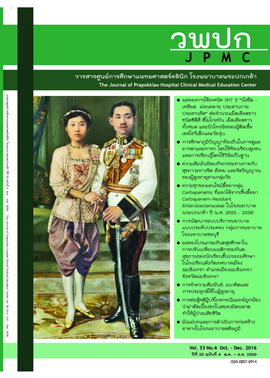การศึกษาภูมิปัญญาท้องถิ่นในการดูแลมารดาและทารก โดยใช้ห้องเรียนชุมชน และการเรียนรู้โดยใช้วิจัยเป็นฐาน
Main Article Content
Abstract
Background : According to the midwifery care standard of World Health Organization, it was indicated that the midwives should do the home visit based on belief and culture of that community. For a nursing curriculum, the maternal and child nursing and midwifery also focuses on the method of integrating local wisdom to strengthen self-care of individuals and family. However, the knowledge of this local wisdom was ambiguous diversity and different based on each context.
Objective: The purpose of this study aimed to study the local wisdom of maternal and child care using a community classroom and research based learning approaches.
Material and Method: This action research used a Plan-Action-Observation-Reflection process to obtain in-depth data. The samples included 2 groups: 50 elders in Nongphai community and 231 third year nursing students. The semi-structured interview guideline to examine the local wisdom for maternal and child care and community based classroom were employed to collect data. Transcripts derived from the interviews were gone through the thematic analyses.
Results: The results found that the elders still had strong taboo against eating some strong odor vegetable and meat during pregnancy and postpartum periods. For new born, the parents were not allowed to prepare anything for a baby before birth. During a postpartum period, the family became main care givers who decided whether to use the local wisdom of Yoo - Fai (lying by fire) or not. The postpartum women should not go to the funeral ceremony. For the herbal use, the elders believed that banana blossom, ginger and lemongrass could help mothers increase their breast milk supply. In terms of teaching and learning evaluation, the students indicated that a community classroom and research based learning approaches were good because they could learn from the elders and more understand about the family support and get the knowledge of local wisdom from the real context. The students realized that although the local wisdom was good, further research using an observation basis and mother and family interview is needed in order to compare the findings with those from elders in the community.
Conclusion: Although most of the local wisdom practices were not congruent with the scientific reasons, the good part of them was the promoting of psycho, social and spiritual well-being. The local wisdom of “Yoo-Fai” presented many potential benefits such as it helps foster sufficient rest among women during the first week of postpartum period and the caring from their family and community. For the practices that needed to adjust, nurses should discuss with a family to change family’s attitudes and advise a proper care in regard to the guideline how to take better care of maternal and child in family.
บทคัดย่อ
ที่มาของปัญหา : ตามมาตรฐานการผดุงครรภ์ของ องค์การอนามัยโลก กำหนดให้มีการดูแลเยี่ยมบ้าน ตามวัฒนธรรม และประเพณีของสังคมนั้นๆ รวมทั้ง จุดมุ่งหมายของรายวิชาการพยาบาลมารดา ทารก และการผดุงครรภ์ หลักสูตรพยาบาลศาสตร์บัณฑิต เน้นให้นักศึกษาผสมผสานภูมิปัญญาท้องถิ่น เพื่อ เสริมสร้างศักยภาพของบุคคล ครอบครัวในการดูแล ตนเอง แต่องค์ความรู้ในส่วนนี้ไม่มีการเก็บรวบรวมที่ ชัดเจน รวมทั้งยังมีความแตกต่างของความเชื่อ และ วัฒนธรรมตามบริบทพื้นที่
วัตถุประสงค์: เพื่อศึกษาภูมิปัญญาท้องถิ่นในการดูแล มารดาและทารกโดยใช้ห้องเรียนชุมชน และการวิจัย เป็นฐาน
วัสดุและวิธีการ: เป็นวิจัยเชิงปฏิบัติการเก็บข้อมูลด้วย วงจร plan – action – observation - reflection กลุ่ม ตัวอย่างเป็นผู้สูงอายุ ต.หนองไผ่ จ.อุดรธานี จำนวน 50 คน และนักศึกษาพยาบาลปี 3 จำนวน 231 คน เครื่องมือเป็นแบบสัมภาษณ์เชิงลึก เรื่องการนำภูมิปัญญาท้องถิ่นมาใช้ในการดูแลมารดาและทารก และแบบสัมภาษณ์ความคิดเห็นของนักศึกษาต่อการ จัดการเรียนการสอน การวิเคราะห์ข้อมูลใช้วิธี วิเคราะห์แยกประเด็น
ผลการศึกษา: พบว่า ผู้สูงอายุยังมีความเชื่อเรื่องการ งดหรือหลีกเลี่ยงอาหารแสลง พวกผักชะอม กบ ไก่ และ เขียด และเชื่อว่าต้องรับประทานหัวปลี ขิงข่า หัว ว่านไฟ และตะไคร้ เพื่อบำรุงน้ำนม ด้านการดูแล ทารกนิยมเลี้ยงด้วยนมแม่อย่างเดียวประมาณ 3 ถึง 4 เดือน ห้ามเตรียมของใช้ทารกก่อนคลอด การอยู่ไฟ ขึ้นอยู่กับวิธีการคลอด และครอบครัวเป็นผู้ตัดสิน ความเชื่อเรื่องการปฏิบัติตัวส่วนใหญ่ห้ามไปร่วมงาน ศพ ด้านการใช้ห้องเรียนชุมชน นักศึกษาประเมินว่า ทำให้ได้เรียนรู้จากสภาพจริง และทำให้ตระหนักว่า ภูมิปัญญาท้องถิ่นเป็นสิ่งที่ดีแต่ต้องนำความเชื่อไป ศึกษาต่อยอด พบข้อเสนอแนะด้านการทำวิจัยว่า ควรเก็บข้อมูลจากการสังเกตการณ์ และการสัมภาษณ์ จากหญิงตั้งครรภ์ มารดาทารกหลังคลอด และครอบครัว ตามสถานการณ์จริงเปรียบเทียบกับข้อมูล ความเชื่อที่ได้จากผู้สูงอายุในชุมชน
สรุป: แม้ว่าภูมิปัญญาท้องถิ่นส่วนใหญ่มักมีเหตุผลที่ไม่สอดคล้องกับหลักทางวิทยาศาสตร์ แต่มีจุดเด่นในแง่การดูแลสุขภาพจิต สังคมและจิตวิญญาณการอยู่ไฟหลังคลอดยังพบข้อดีอยู่มากเพราะทำให้หญิงหลังคลอดได้พักผ่อนเต็มที่ ในช่วงสัปดาห์แรก และได้รับการดูแลอย่างดีจากครอบครัว และชุมชน ส่วนพฤติกรรมที่ต้องปรับเปลี่ยนควรมีการพูดคุย ปรับทัศนคติ และให้ความรู้ที่ถูกต้องเพื่อความร่วมมือในการปฏิบัติตัวหลังคลอดที่เหมาะสมต่อไป

